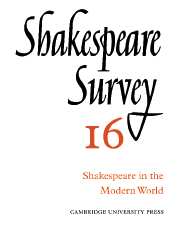Book contents
- Frontmatter
- An Obligation to Shakespeare and the Public
- Our Closeness to Shakespeare
- The Popularity of Shakespeare: An Examination of the Royal Shakespeare Theatre’s Repertory
- Shakespeare and the Fashion of These Times
- An Approach to Shakespearian Tragedy: The ‘Actor’ Image in Macbeth
- Shakespeare’s Impact Today in France
- Shakespeare and the Modern World
- Modern ‘Theatrical’ Translations of Shakespeare
- Shakespeare as ‘Corrupter of Words’
- Shakespeare in Ghana
- ‘Timon of Athens’
- Who Strutted and Bellowed?
- Shakespeare in Planché’s Extravaganzas
- ‘Our Will Shakespeare’ and Lope de Vega: An Unrecorded Contemporary Document
- Shakespeare and the Mask
- International Notes
- Shakespeare Productions in the United Kingdom: 1961
- Acting Shakespeare Today. A review of performances at the Royal Shakespeare Theatre, August 1962
- Canada’s Achievement
- 1 Critical Studies
- 2 Shakespeare’s Life, Times and Stage
- 3 Textual Studies
- Books Received
- Index
- Plate section
3 - Textual Studies
Published online by Cambridge University Press: 28 March 2007
- Frontmatter
- An Obligation to Shakespeare and the Public
- Our Closeness to Shakespeare
- The Popularity of Shakespeare: An Examination of the Royal Shakespeare Theatre’s Repertory
- Shakespeare and the Fashion of These Times
- An Approach to Shakespearian Tragedy: The ‘Actor’ Image in Macbeth
- Shakespeare’s Impact Today in France
- Shakespeare and the Modern World
- Modern ‘Theatrical’ Translations of Shakespeare
- Shakespeare as ‘Corrupter of Words’
- Shakespeare in Ghana
- ‘Timon of Athens’
- Who Strutted and Bellowed?
- Shakespeare in Planché’s Extravaganzas
- ‘Our Will Shakespeare’ and Lope de Vega: An Unrecorded Contemporary Document
- Shakespeare and the Mask
- International Notes
- Shakespeare Productions in the United Kingdom: 1961
- Acting Shakespeare Today. A review of performances at the Royal Shakespeare Theatre, August 1962
- Canada’s Achievement
- 1 Critical Studies
- 2 Shakespeare’s Life, Times and Stage
- 3 Textual Studies
- Books Received
- Index
- Plate section
Summary
Two more volumes of the New Arden Shakespeare are now in print. The earlier is 1 Henry IV, edited by A. R. Humphreys. The introduction deals admirably with the political and moral themes of the play, the sources, and the characters. Humphreys believes that in the composition of Richard II Shakespeare envisioned a series of plays extending into the reign of Henry V and that Richard II and the two parts of Henry IV were written in swift succession. Only thus could the name ‘Oldcastle’ have fixed itself so firmly in the public mind that, years after ‘Falstaff’ replaced it in the first quarto of Henry IV, theatregoers and even the members of Shakespeare’s own company referred to Part I as Oldcastle and wrote of how ‘the fat Knight, hight Oldcastle, Did tell you truly what this honor was’. It is Humphreys’ belief that the play was probably written in 1596 and performed during the next season. William Brooke, Lord Cobham, a descendant of Oldcastle, was Lord Chamberlain from 22 July 1596 until his death on 5 March 1597 and was in a position to require an immediate change in the name if he felt anything touched the family honour: but there is a possibility that this action was left to his son Henry, who succeeded to his title but not to his office as Lord Chamberlain. In all likelihood the enforced change of Oldcastle’s name was made before 17 March 1597, when Sir George Carey, the second Lord Hunsdon and, like his late father, the patron of the Shakespeare-Burbage company, became Lord Chamberlain.
- Type
- Chapter
- Information
- Shakespeare Survey , pp. 172 - 181Publisher: Cambridge University PressPrint publication year: 1963

